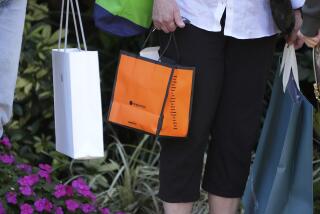Bad weather held back January growth, ‘beige book’ says
Severe weather held back economic growth in much of the nation from January through early February, a Federal Reserve survey shows. Even so, conditions strengthened in most U.S. regions, thanks to slight gains in areas such as employment and commercial real estate.
Eight of the Fed’s 12 regions reported improved activity, according to the “beige book” survey released Wednesday. The improvement was depicted as “modest to moderate.”
New York and Philadelphia, two regions hard hit by winter storms and freezing cold, reported a dip in activity attributed to the weather. Retail sales, including auto purchases, were depressed. So was manufacturing. Factories reported power outages and delayed deliveries of supplies.
The beige book is based on anecdotal reports from businesses and will be considered with other data when the Fed meets March 18-19.
The summary and the individual reports from each of the 12 regions were sprinkled with references to the harsh weather much of the country has endured this winter.
The report said retail sales had weakened in many districts because of winter storms. Nine districts — Boston, New York, Philadelphia, Cleveland, Atlanta, Chicago, St. Louis, Dallas and Richmond, Va. — reported that the severe weather had hurt factory production and manufacturing sales.
The report said the weather had caused power outages, disrupted supply chains and curtailed factory production schedules.
Travel and tourism were reported to be strong across most of the districts, with the heavy snowfalls benefiting ski resorts in some parts of the country.
When the Fed meets this month to consider the beige book, among other economic evidence, it will be the first meeting under the new Fed chair, Janet Yellen. Last month, Yellen succeeded Ben Bernanke, who stepped down after eight years as chairman.
The widespread expectation is that the Fed will continue paring the monthly bond purchases it has been making to try to keep long-term loan rates low to support the economy.
In an appearance last week to deliver the Fed’s twice-a-year economic report to Congress, Yellen said recent data have pointed to some weaker-than-expected gains in consumer spending and job growth.
She said the Fed would be watching to see whether the slowdown proved only a temporary blip caused by severe weather. Yellen said she was open to adjusting the pace of the Fed’s reductions if the economy should weaken.






